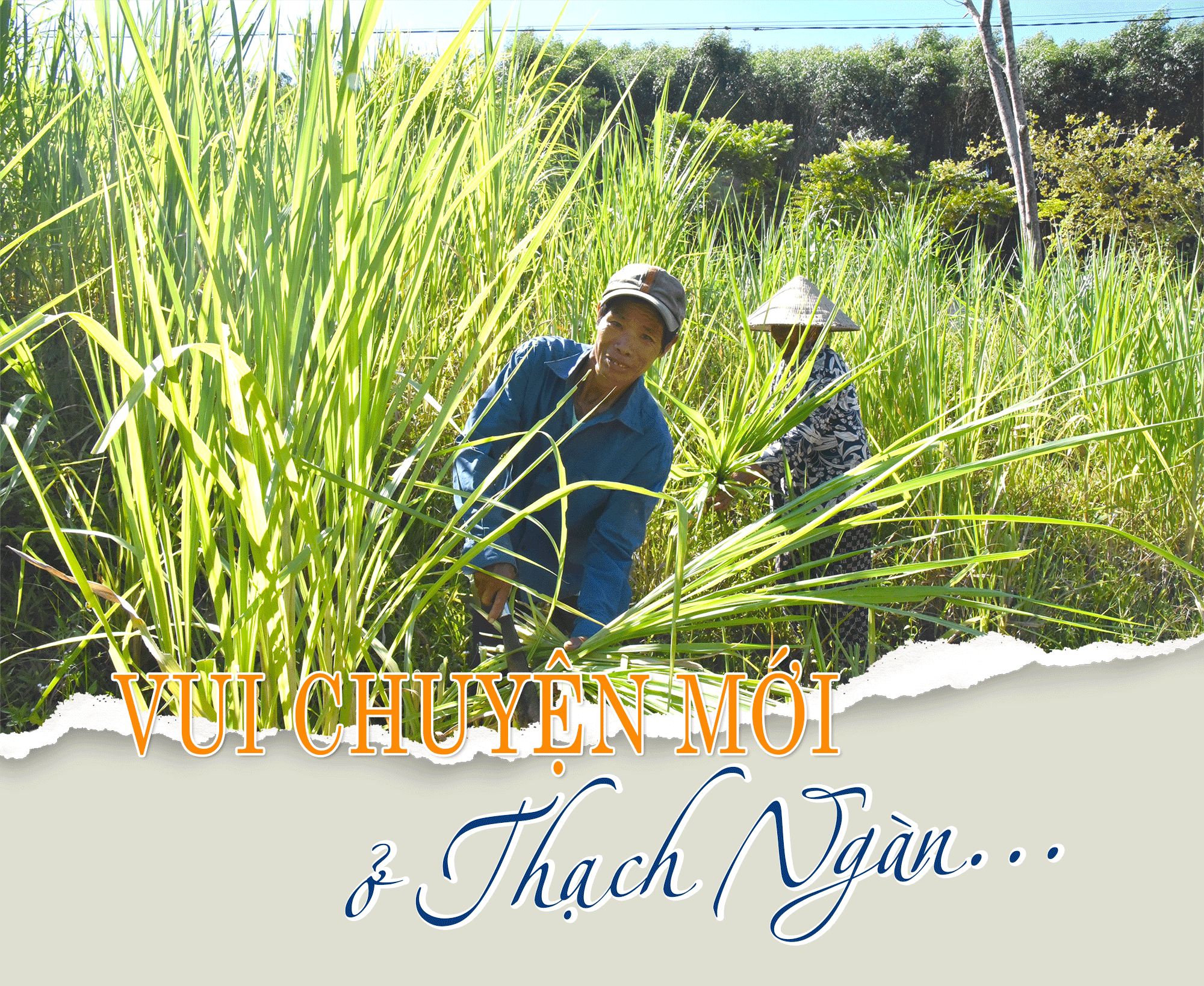
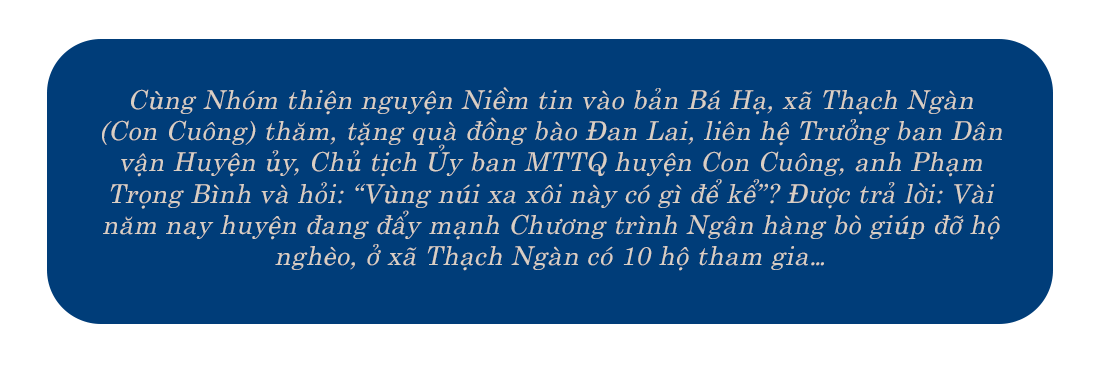

Our trip to Thach Ngan commune on the morning of July 12th was marked by a prolonged period of intense heat, making the landscape in this impoverished area even more desolate and barren. Looking at the dried-up irrigation canals and the withered, barren fields unsuitable for summer-autumn cultivation, we wondered: Where will the villagers get the grass to raise cattle? Among the delegation visiting the Dan Lai people in Ba Ha village was the Chairman of the Fatherland Front Committee of Thach Ngan commune, Vi Van Bien. After our conversation, he said: "After you're done, please come visit Dong Thang village, where the commune has chosen to implement the Cattle Bank Program."
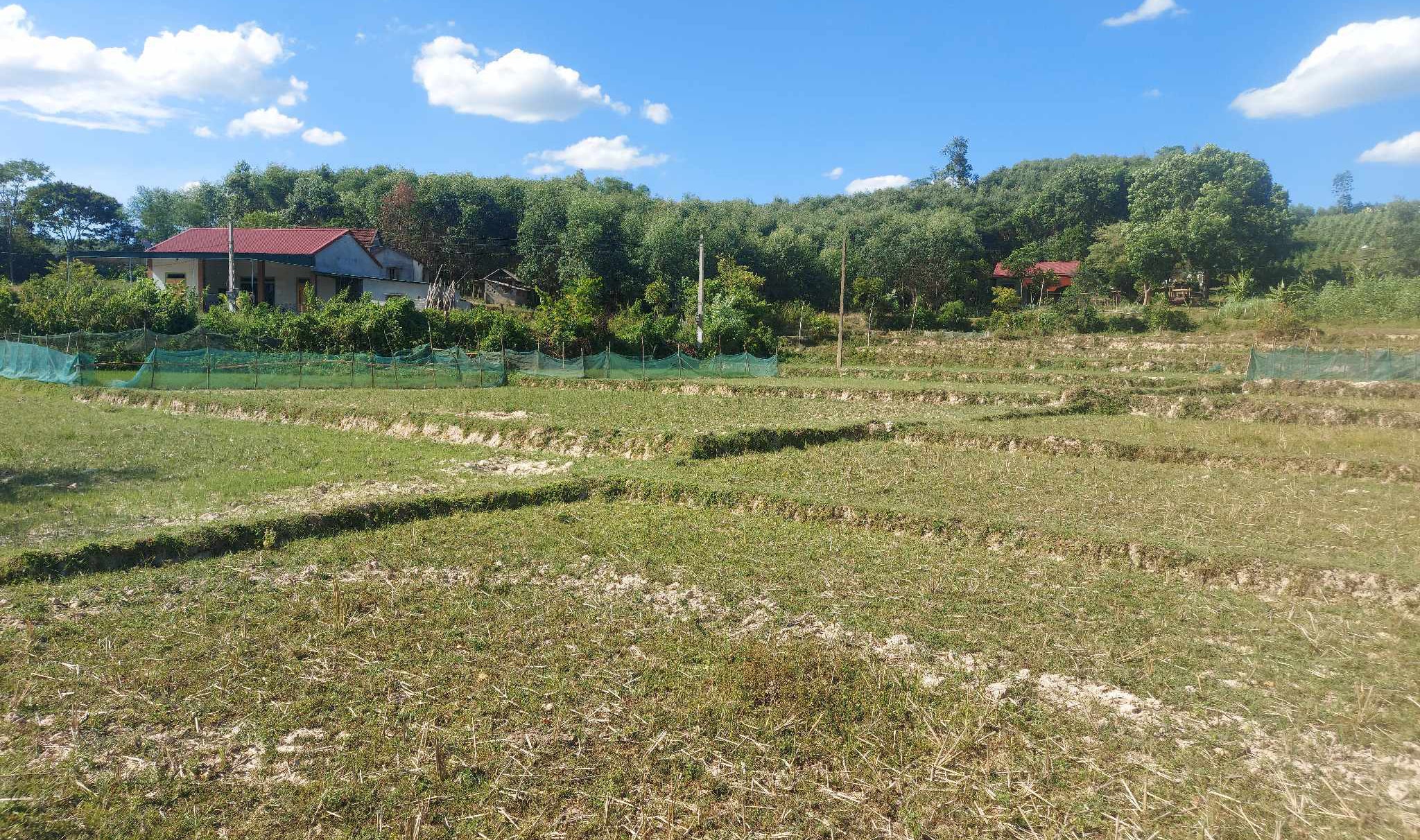
That afternoon, together with Mr. Vi Van Bien and Mr. Vi Van Dieu, the Chairman and Vice Chairman of the Fatherland Front Committee of Thach Ngan commune, and Ms. Luong Thi Thang, the head of Dong Thang village, we visited the poor households participating in the Cattle Bank Program. The family of Mr. Lo Van Kinh and Ms. Loc Thi Binh was one of them. Having worked as a village official for many years, Ms. Thang understood Mr. Kinh's family's circumstances very well. She recounted that Mr. Lo Van Kinh had a very special situation; he was poor and had a congenital disability that prevented him from speaking. Even his marriage to Ms. Loc Thi Binh, from Binh Son commune, Anh Son district, was arranged by his family and fellow villagers. Now, thanks to government policies, the assistance of the Party committee, the government, and the villagers, Mr. Kinh's family has two rooms built and breeding cows to raise, but they still face many difficulties and have not yet been able to escape poverty.
Mr. Kinh's family lives on a gentle hilltop, next to his son's house. He cultivates elephant grass on his entire garden plot to feed his cattle. Mr. Kinh, a small, dark-skinned man, rushed out to greet the visitors, gesticulating wildly and muttering something. Village head Luong Thi Thang interjected, "Every day Mr. Kinh takes his cows out to graze himself. Knowing visitors would be coming this afternoon, he kept them in the barn. He meant to invite everyone to come and see them." Mr. Kinh's cattle barn is quite spacious and clean, with a straw storage area nearby. Inside, there is a mother cow and two generations of calves, about 5-6 months old, with glossy, healthy orange-yellow skin.
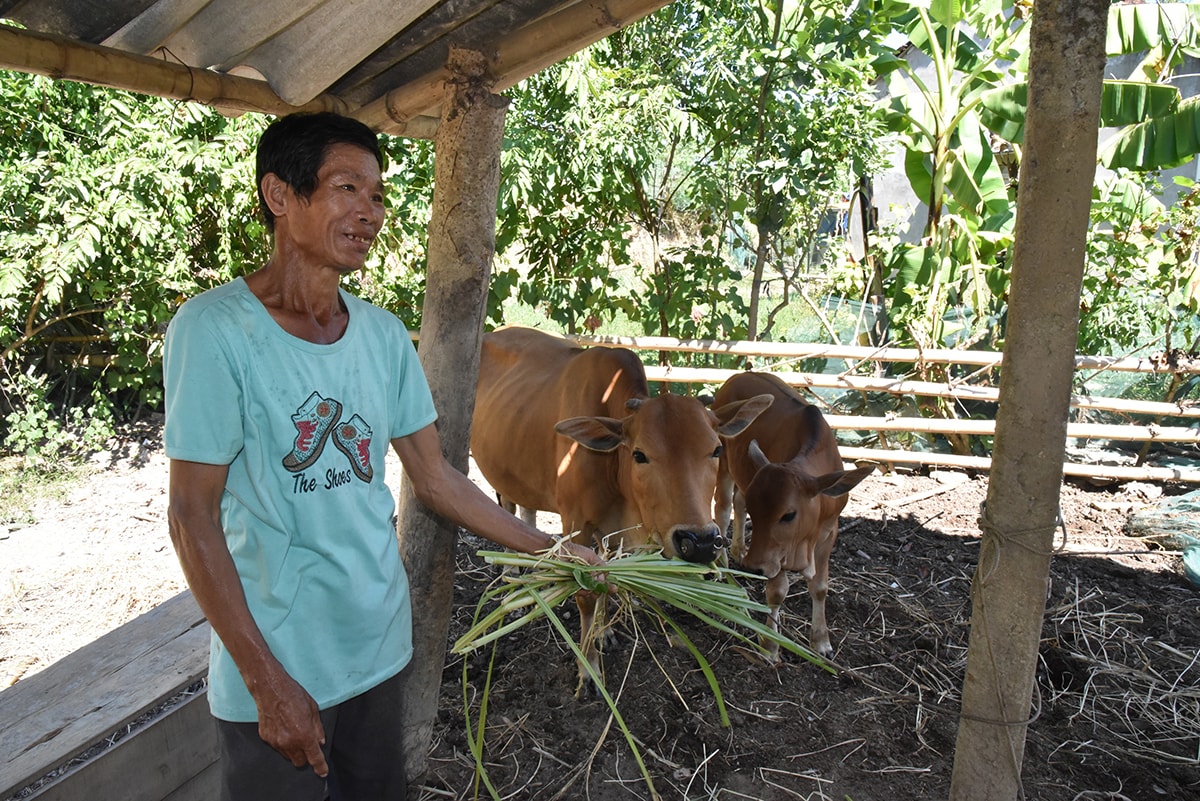
While feeding elephant grass to the cows, Mr. Kinh's daughter-in-law, Ms. Ha Thi Huong, shared that in 2022, their family received 12 million VND from the Cow Bank Program to purchase breeding cows. They chose to buy a mother cow and her calf. After some time, the mother cow became pregnant and gave birth to another calf. “He takes care of them more than himself. Since buying them, he’s been constantly around them. You can ask him questions; he can’t speak, but he still listens…” Hearing Huong’s story, we asked Mr. Kinh: “How do you find raising breeding cows? Are you happy? Do you intend to raise them long-term or sell them for money later?” He smiled, then shook his head and gestured with his hands. Ms. Huong “translated”: “He won’t sell them. He has to fulfill his commitment to raise the mother cow for 5 years. Now he has one breeding cow and two calves. One calf will be transferred to another family soon. He will raise them long-term to have more cows…”
Leaving Mr. Lo Van Kinh's house, we visited the family of Ms. Lo Thi Thuy and Mr. Luong Van Nguyen. Ms. Thuy has a house built in her husband's family's garden. The land, given to them by her parents, is used for planting elephant grass, which is now overgrown. Ms. Thuy recounted that her husband works as a laborer in Hanoi and sends about 4 million dong home to her and their child each month. When they got married and moved out on their own, they had no assets. Therefore, when the government gave them 12 million dong to buy a cow, they were very happy. When asked if the project officials had any requirements when the money was given, Ms. Thuy laughed and said, "The superiors reminded us to buy a mother cow. They required us to plant grass and raise the cow well…" Then she said that when she told her husband about the money for raising the cow, he was very happy, and every time he called home, he reminded her, "You must raise the cow and the child well…"
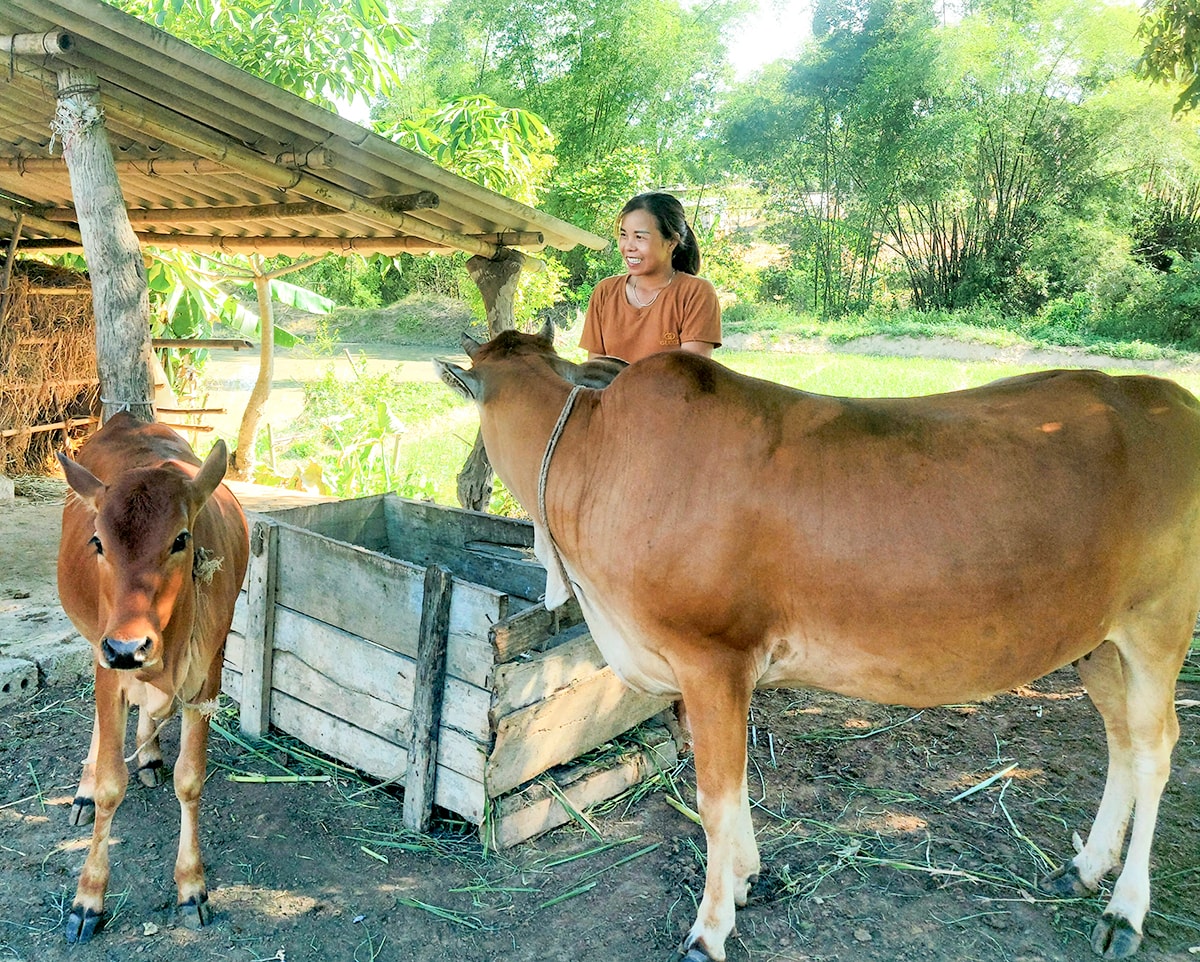
Ms. Thuy now owns a mother cow and her calf, both weighing approximately the same; the mother cow is pregnant again. Ms. Thuy excitedly shared: “My family is lucky because we bought the cow from a relative in the village while it was pregnant. We bought it in April 2022, and by November it had already given birth. Now the mother cow is pregnant again, and in a few months we'll have another calf.” When asked jokingly, “The calf is now 8 months old and almost as big as its mother. Do you regret having to transfer it?” Ms. Thuy laughed heartily: “Of course I do. But that’s the ‘rule,’ we have to transfer it so the authorities can give it to another family to raise like us…”
A few rice paddies away from Ms. Lo Thi Thuy's house, the family of Mr. and Mrs. Lo Van Chuong and Nguyen Thi Hai also received support to purchase breeding cows. When they bought them, the couple contributed an additional 2.5 million VND to purchase a native mother cow that was four months pregnant. Thanks to good care, it's now difficult to distinguish between the mother cow and the calf. According to Ms. Nguyen Thi Hai, in 2022, her family was classified as a poor household. Thanks to the Cow Bank Program and the 40 million VND support policy to rebuild their house, her family has moved out of poverty. Ms. Hai said: “My family works in agriculture, and we still face difficulties. But as a young couple, we now have a house, a cow… that’s enough to make things temporarily stable, so we moved out of poverty to give the opportunity to other families. I am very grateful to the government for supporting my family…”


Thach Ngan commune is home to 80 Dan Lai ethnic minority households who have settled in Thach Son and Ba Ha villages. Moving from the heart of the Pu Mat forest to their new home, the Dan Lai people face extremely difficult living conditions, especially those in Ba Ha village who only moved there in 2019. The land allocated to them for rice cultivation is very limited. Therefore, upon hearing the introduction of Mr. Vi Van Dieu – Vice Chairman of the Fatherland Front Committee of the commune and also the Party Secretary of Ba Ha village – from the Thach Ngan commune officials, they inquired why the Cattle Bank Program was only implemented in Dong Thang village and not in Thach Son and Ba Ha villages.
According to Party Secretary Vi Van Dieu, the Dan Lai people, upon relocating to Thach Ngan commune, received support in the form of buffaloes, pigs, and poultry. Although they have lived there for five years, their mindset regarding livestock farming hasn't changed; they still let their animals roam freely instead of building shelters for home care. Therefore, raising breeding cows requires a period of hands-on training. Only when households with the necessary capabilities are selected will they be allowed to participate by higher authorities. Hearing this, the Chairman of the Fatherland Front Committee of the commune, Vi Van Bien, added: “The reason Dong Thang village was chosen is because out of 123 households, only 12 are still poor. With the participation of 10 households in the Cow Bank Program, we hope Dong Thang village will soon be freed from poverty. As for the Dan Lai people, it will take time to find individuals to provide technical guidance, and only when they develop the awareness and proficiency in livestock farming methods can they participate in the program…”
Accompanying us to Dong Thang village was Mr. Nguyen Quoc Dai, a specialist from the Fatherland Front Committee of Con Cuong district. Being an insider, he clearly recounted the circumstances surrounding the creation of the Cattle Bank Program. According to Mr. Dai, over the years, like other mountainous districts of the province, Con Cuong district has received attention from the Party and the State, implementing many socio-economic development programs and projects. However, Con Cuong remains a poor mountainous district, and the lives of ethnic minority people still face many difficulties. Of the 12 communes in the district, 9 are classified as extremely disadvantaged; there are 3,600 poor households, of which more than 3,400 belong to ethnic minority groups.

The lives of the people in Con Cuong district still mainly depend on agriculture, but they lack capital and technical skills to independently develop production, livestock farming, and crop cultivation. Furthermore, there are still not many effective and sustainable poverty reduction models in the area. Faced with this reality, the district Party committee and government have set forth the requirement to develop more successful "People's Mobilization" models to help poor households with capital and technical skills, exploiting the potential and advantages of the locality with the goal of achieving sustainable poverty eradication.
In that spirit, the Standing Committee of the District Fatherland Front Committee chose to implement the Cattle Bank Program, with the full name being the Project "Developing breeding of female calves to create livelihoods for poor and near-poor households to escape poverty sustainably". In 2020, with the approval of the District Party Committee Standing Committee and the support of the Provincial Fatherland Front Committee, the Cattle Bank Program, with funding from the "For the Poor" Fund, was implemented with the goal of supporting poor and near-poor households to develop breeding of native and Sindhi crossbred cows; thereby creating livelihoods, jobs, and increasing income; gradually expanding the model; and contributing to achieving the goal of sustainable poverty reduction and ensuring social security.
To participate in the Cattle Bank Program, households must meet several mandatory conditions. Specifically, they must first be poor or near-poor households residing in the communes within the area. Simultaneously, households must submit a voluntary application to participate in the project and a commitment letter. The commune-level Project Management Board is also responsible for reviewing and ensuring that participating households have full legal capacity, the ability to learn cattle breeding techniques, and sufficient healthy labor to raise cattle; and they must also possess at least 500 square meters of land.2Land for growing grass, ensuring food for the cows.
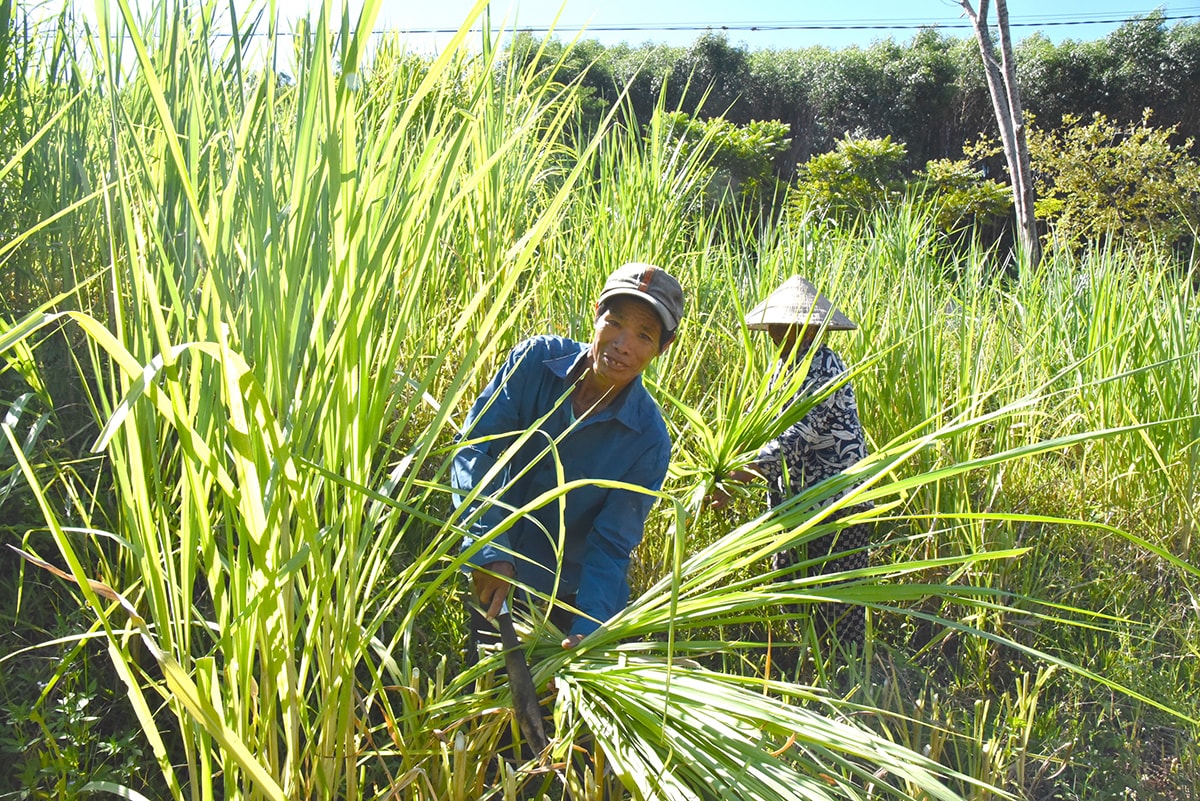
Regarding the implementation process, households receive capital support to purchase breeding cows. From the second year onwards, the project cows will reproduce. The calves will be cared for until they are about 9-10 months old and weigh the same as their mothers, at which point the Project Management Board recovers the capital. That is, the household will hand over the calves to the Project Management Board for transfer to other poor households in the area. According to Mr. Nguyen Quoc Dai, the program started in 2020 in three communes: Mon Son, Lang Khe, and Cam Lam, with 30 local mother cows. To date, these cows have produced 23 calves, and 21 have been transferred to 21 subsequent households. In 2021, the program was implemented in five communes: Binh Chuan, Don Phuc, Mau Duc, Chau Khe, and Luc Da, with 50 participating households. Families received 15,000,000 VND each, totaling 750,000,000 VND, to purchase 50 Sind crossbred cows. To date, most households have successfully managed their livestock farming, and the cows are thriving, but due to their Sind crossbreeding, they have a slower reproductive cycle. In 2022, the program continued in three communes: Chi Khe, Yen Khe, and Thach Ngan, with 30 breeding cows, totaling 360,000,000 VND. After one year, this herd of cows produced 20 calves, of which 2 calves were transferred to two families in Chi Khe commune.
“After 3 years of implementation, from the initial 110 breeding cows, an additional 44 calves have been born. Due to 7 cows dying from illness, the total herd size of the program is now 148 cows, of which 24 have been transferred to 24 poor households. The estimated average value of each cow is 15,000,000 VND, and the total capital of the program is currently 2.2 billion VND. Compared to the capital invested over the 3 years combined, there has been a profit of approximately 800 million VND. Of the 110 households participating in the project, 13 have escaped poverty and 19 have moved from poor to near-poor. Based on these results, the Standing Committee of the District Fatherland Front Committee assesses this as a truly effective model…”
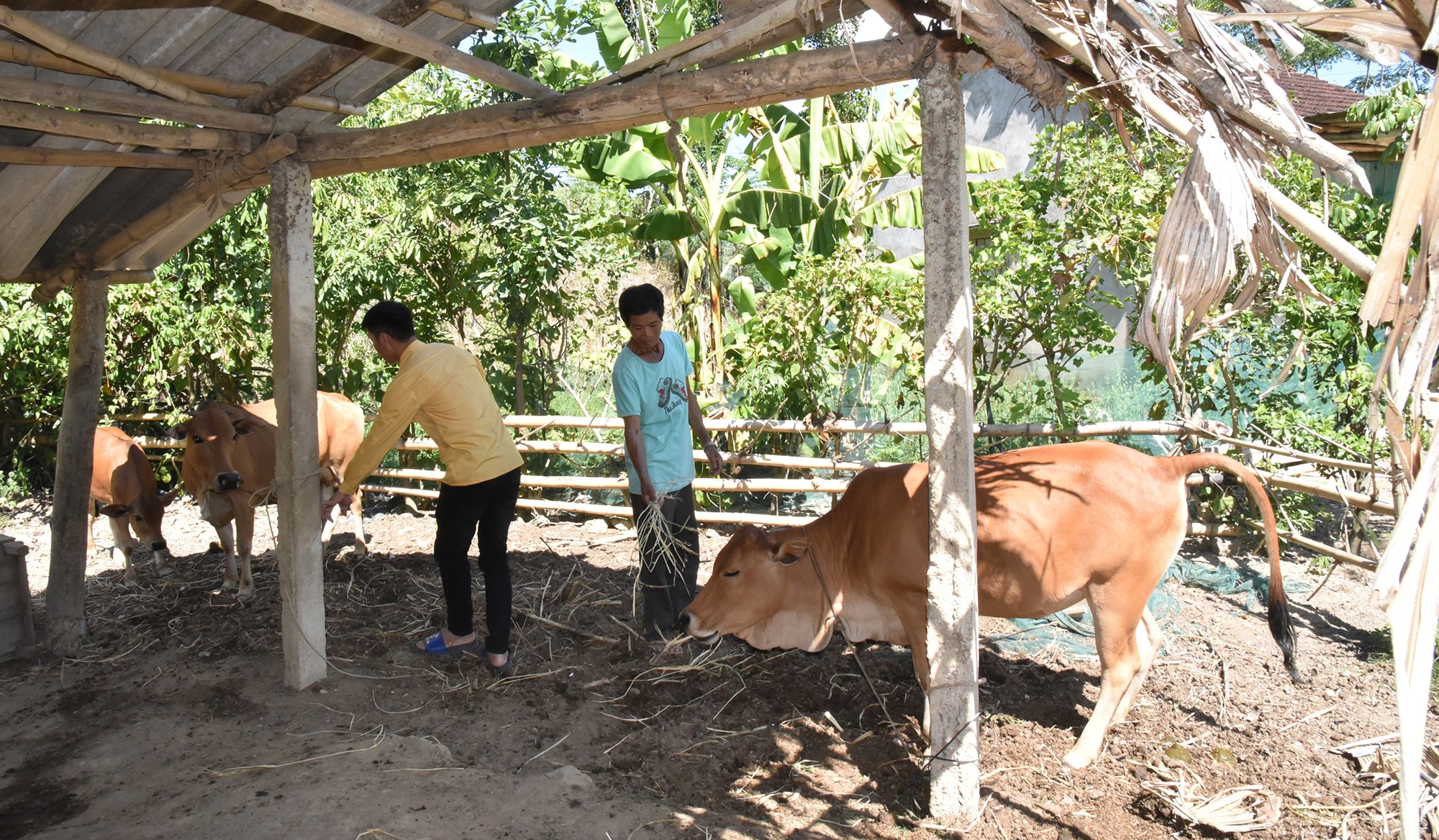
…We left Thach Ngan commune as the sun was setting. On the way back, we contacted the Head of the District Party Committee's Mass Mobilization Department and Chairman of the Con Cuong District Fatherland Front Committee, Mr. Pham Trong Binh, to ask for his personal thoughts on the Cattle Bank Program. His answer was: “Although it is the first time it has been implemented, this is a fairly effective program, with great consensus from officials and people, and adherence to the plan developed by the District Fatherland Front organization. I have jokingly said on my personal Facebook page a few times, ‘I feel like this business trip has been profitable.’ But indeed, the people participating in the program have been very responsible and conscious of the money from the ‘For the Poor’ Fund that collectives, businesses, households, and individuals have contributed and given to them. Their awareness has made those meaningful funds even more significant. Therefore, this program will continue to receive funding and be expanded…”
